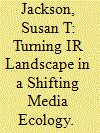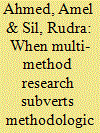| Srl | Item |
| 1 |
ID:
117031


|
|
|
|
|
| Publication |
2012.
|
| Summary/Abstract |
In a 2008 International Politics article, David Patrick Houghton questions the importance of 'The Third Debate' in IR theory between 'positivism and postmodernism' and the relative worth of contrasting epistemological positions. Houghton's main argument is that the philosophical underpinnings of IR have not been central to what IR scholars actually do; specifically, the epistemological differences between positivists and postmodernists have little practical effect upon their empirical findings. In short, epistemology does not matter. This article analyses Houghton's thesis within the context of a dominant discourse in the discipline that derides postpositivism and, by corollary, rejects methodological pluralism incorporating both positivist and postpositivist approaches, what I refer to as 'epistemethodological pluralism'. This article questions the main assumptions underpinning this discourse by deconstructing the definition of 'postpositivism' that underpins the 'naysayer' arguments deriding or dismissing epistemological differences between positivism and postpositivism. Using examples of positivist and postpositivist research that focus on the foreign policy of the United States, European Union integration and Middle East politics, the article demonstrates how epistemological issues have a significant impact on empirical research in International Relations and illustrates the benefits of integrating the different epistemological approaches.
|
|
|
|
|
|
|
|
|
|
|
|
|
|
|
|
| 2 |
ID:
119993


|
|
|
|
|
| Publication |
2013.
|
| Summary/Abstract |
The article looks at one of the central arguments of Patrick Jackson's book The Conduct of Enquiry in International Relations: the attempt to advance methodological pluralism and dialogue among contending metatheoretical schools of International Relations. The article supports the goal of pluralism but argues that there is a significant gap in Jackson's support of it and that his version of pluralism inhibits metatheoretical engagement of different schools of thought. The latter in turn limits the possibility of progress in the field. The article outlines the missing steps in Jackson's argument, the way in which he unduly limits the contribution that the philosophy of science can make to scientific progress and an alternative argument for pluralism that leaves a role for genuine philosophical engagement and the possibility of progress in IR.
|
|
|
|
|
|
|
|
|
|
|
|
|
|
|
|
| 3 |
ID:
133788


|
|
|
|
|
| Publication |
2014.
|
| Summary/Abstract |
At the contested analytic core of this special issue of Pacific Affairs lie two different ways of linking enlargement to assessment. Southeast Asian studies, as a spatially limited instance of Area Studies (AS), are focused wholly or mainly on one part of the world and on phenomena occurring in it or directly relevant to it. In contrast, no toponym constrains the scope of Comparative Area Studies (CAS). The editors of this issue recommend the expansion of AS into CAS. Does a convincing case for such enlargement from AS to CAS require only a nominal or taxonomic expansion-subsuming more space in which comparisons can be made-without necessarily privileging one method over another? Or does the case for CAS presuppose a negative assessment of AS as less hospitable to systematiccomparison, and thus methodologically inferior to CAS? The discussion that follows is not epistemologically agnostic. Nor is it promiscuous as to methods. But it emphasizes the need for methodological pluralism and the virtues of openness and ecumenism thereby implied. A segue from AS to CAS will multiply the opportunities for comparison along with the scale and complexity of the items, changes, and interactions that could be compared. It may be tempting to simplify all these empirics by filtering them through the lens and format of a systematically reductive technique. It would however be ironic if that understandable temptation were to reproduce in method the narrowness of scope that warranted CAS in the first place. If and as scholars expand their analytic horizons in the hope of making more sense of a globalizing world, the notion of unwanted or uncontrolled comparison may seem less demonic-a "spectral" invitation to chaos-than creative-an intellectually refreshing way of thinking outside of any box whose efficacy depends disproportionally on closure.
|
|
|
|
|
|
|
|
|
|
|
|
|
|
|
|
| 4 |
ID:
168404


|
|
|
|
|
| Summary/Abstract |
Each year the prevalence of digitized information becomes more entrenched, not least with the amount of activity on social media. Yet, new media studies pose a number of challenges to international relations scholarship, which are only beginning to be addressed. With some exceptions IR scholars who conduct this research tend to rely on traditional qualitative methods and have been hesitant to embrace interdisciplinary collaboration—especially with those disciplines outside of the social sciences—as well as methodological pluralism across interpretive and quantitative approaches within the social sciences. This tendency shows a general lack of understanding of what new/social media might mean, not only as a source of and tool for generating information but also as a structural factor in how we conduct IR research and practice international relations. In this way, social media can provoke IR scholars to ask questions about their own discipline. This article aims to address these challenges and to provide suggestions on how to bring structural aspects of new media into IR research. In particular, it incorporates ideas centered on the shifting media ecology as fundamental to examining these structural challenges in terms of practicing international relations and in the visual turn in IR.
|
|
|
|
|
|
|
|
|
|
|
|
|
|
|
|
| 5 |
ID:
116437


|
|
|
|
|
| Publication |
2012.
|
| Summary/Abstract |
While acknowledging the many forms and contributions of multi-method research (MMR), we examine the costs of treating it as best practice on the grounds that it reduces method-specific weaknesses and increases external validity for findings. Focusing on MMR that combines some type of qualitative analysis with statistical or formal approaches, we demonstrate that error-reduction and cross-validation are not feasible where methods are not sufficiently similar in their basic ontologies and their conceptions of causality. In such cases, MMR may still yield important benefits-such as uncovering related insights or improving the coding of variables-but these can be readily obtained through collaboration among scholars specializing in single-method research (SMR). Such scholars often set the standards for the application of particular methods and produce distinctive insights that can elude researchers concerned about competently deploying different methods and producing coherent findings. Thus, the unchecked proliferation of multi-method skill sets risks forefeiting the benefits of SMR and marginalizing idiographically-oriented qualitative research that fits less well with formal or quantitative approaches. This would effectively subvert the pluralism that once gave impetus to MMR unless disciplinary expectations and professional rewards are predicated on a more balanced and nuanced understanding of what various forms of SMR and MMR bring to the table.
|
|
|
|
|
|
|
|
|
|
|
|
|
|
|
|